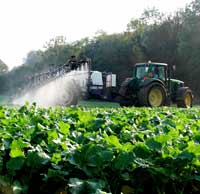Fresh warning over banned pesticide use

The Environment Agency is carrying out more rigorous water testing this season after IPU was found above drinking water standards in samples last autumn.
Other key pesticides found at unacceptable levels included chlorotoluron, propyzamide, carbetamide and metazachlor.
Voluntary Initiative Manager Patrick Goldsworthy: “Growers should take a thorough check of the chemical store to avoid illegal applications otherwise they risk serious penalties, such as loss of single farm payment.”
James Clarke of ADAS and chairman of the Pesticides Forum says evidence of growers breaking the law will be easy to prove as residues in the soil will show if there has been recent usage of banned herbicides, such as IPU.
Chemicals can be readily detected in water and pinpointing where they come from is a relatively simple exercise for regulators, he adds.
“Looking upstream in any catchment where the legal limits on pesticide concentration have been exceeded, will point to fields where it is likely that applications have been made,” says Mr Clarke.
One suggested reason for last year’s IPU findings was that the wet autumn in 2008 meant growers were unable to apply IPU they had purchased and the 20 June cut-off didn’t give sufficient time to use the product.
According to Makhteshim, straight formulations of chlorotoluron (CTU) currently on farm must be used up by 31 August, 2011. Any remaining stocks after this date must be disposed of by a licensed waste contractor.
Paul Fogg, a technical manager at Makhteshim, says: “I’d encourage growers to use up their stocks of chlorotoluron at pre-emergence this autumn.
“This will reduce use of the chemical later in the season when soils are wetter and there may be an increased risk of runoff into watercourses.”
Co-formulations of CTU are not affected by the Chemicals Regulation Directorate’s revocation and they can still be used legally.
Changes to the usage of some phenoxy herbicides have also been made over the last 12 months. Nufarm’s Jon Staton says products containing MCPA + MCPB, such as Tropotox Plus, which gave control of perennial weeds such as thistles in clover rich leys and for use in peas and undersown cereals are under revocation.
But products such as Tropotox, containing just MCPB, retain a recommendation in peas, he adds.
He says that straight MCPA can no longer be applied by hand-held applicators and growers using knapsack sprayers will have to look at alternative products, such as 2, 4-D.
Growers are advised to talk to their agronomists if unsure or visit the CRD website www.pesticides.gov.uk.

